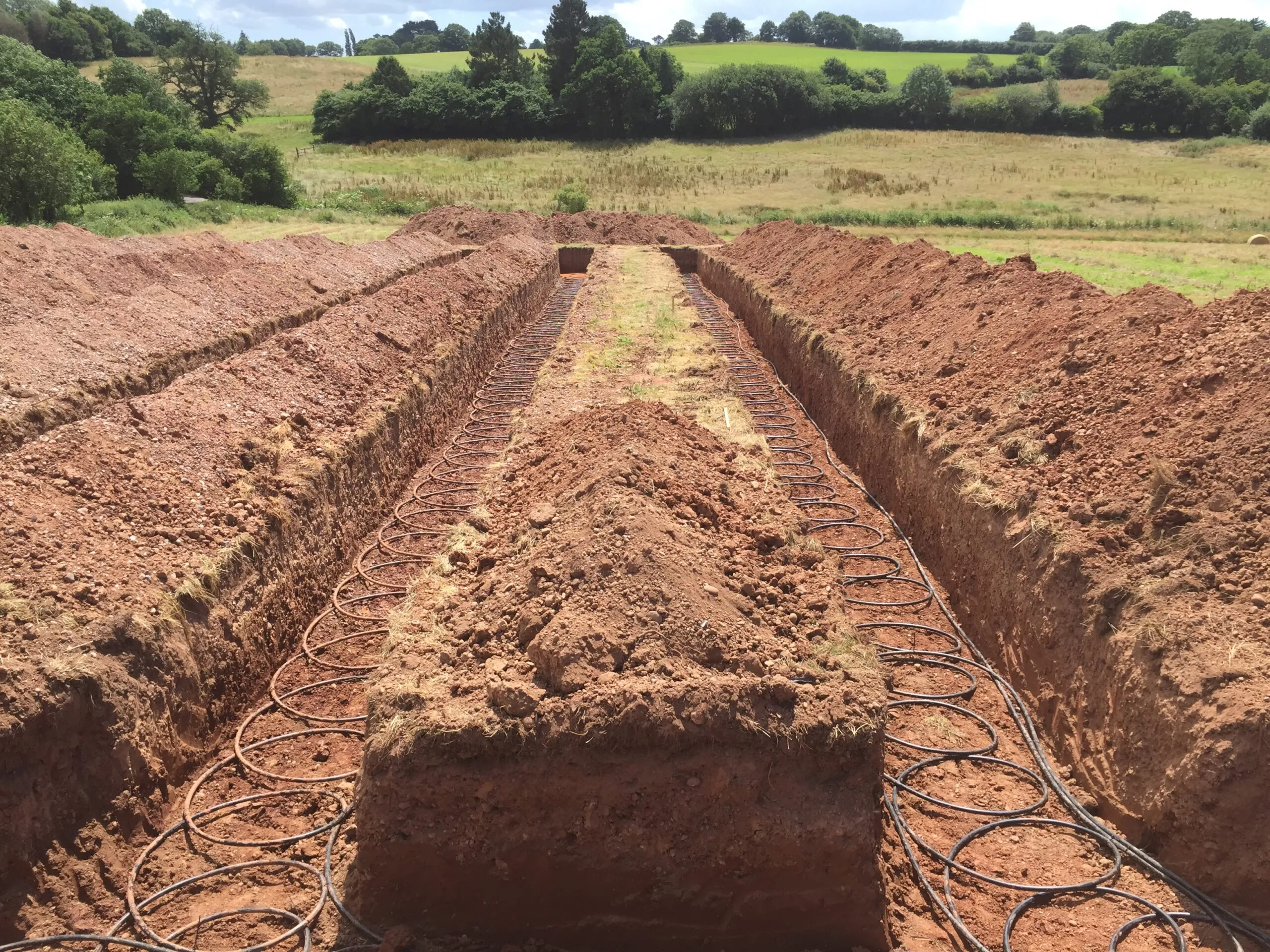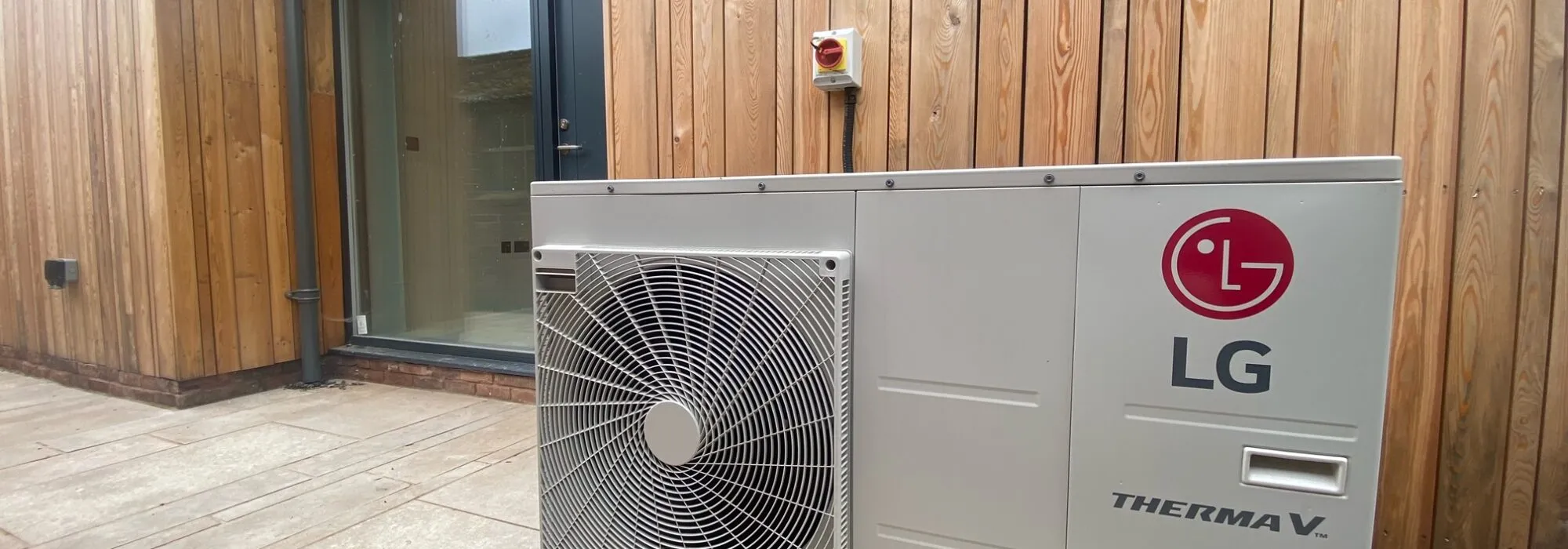Renewables
As a registered member of the Microgeneration Certification Scheme, or MCS for short, you can be confident that we have had all the necessary training and possess the expertise to guide you through the whole process of making the switch from a fossil fuel (natural gas, LPG, oil, etc) over to an environmentally friendly low carbon heat pump. Heat pumps are on average 300-400% efficient this compares with a gas boiler that is typically between 90-94% efficient. Gas boilers, are better than they were due to the condensing technology they now use but they still burn a fossil fuel to generate heat and that produces carbon emissions. Globally we need to reduce the amount of CO2 that is produced and one of the easiest ways we can make a huge difference is by switching to heat pumps. If the electricity consumed by the heat pump comes from a renewables source then the carbon emissions from it will be zero when running.
Heat pumps can be either an air source, which is the most common, a ground source or less well known water source heat pump. This means that they (the heat pump) will take the heat required to operate either out of the air, ground or water such as a lake. It then passes through a compressor which then increases the heat and then that heat passes over to your heating system by means of a heat exchanger. The process by which it works is basically the same as you will find in your fridge, it just works in reverse, instead of producing a lower temperature to keep your milk cool it produces heat to provide you with heating and hot water.
There are a number of myths surrounding heat pumps one being that heat pumps won’t work in England as it is too cold and work better in warmer in climates. This is not true. In Europe the countries with the most heat pumps are Norway, Sweden and Finland, with Norway having over 24,000 heat pumps per 100,000 people. That is nearly a quarter of all their heating and hot water produced by heat pumps. In the UK we are a long way behind Scandinavian countries with approximately 0.5%, at time of writing. Scandinavian countries are far colder than the UK so if a heat pump can be an efficient means of heating there, then they will work here.
It is often said that you have to have underfloor heating when installing a heat pump, again this is not the case. Whilst a heat pump is very effective at working with correctly installed underfloor heating it does not mean that radiators cannot be used. It is absolutely fine to run a heat pump heating system through radiators. Yes the radiators need to be larger when compared to a gas boiler and this is due to the lower flow temperature associated with a heat pump but the radiators don’t need to take up the whole wall, a slightly larger radiator will normally suffice. Some more modern heat pumps are beginning to reach higher temperatures as well meaning similar size radiators however if the flow temperature gets to high then the heat pump efficiency is affected.
Are heat pumps noisy? Whilst there are MCS standards in place that need to be followed for the positioning of a heat pump, i.e. not under a bedroom window or within so many metres of a neighbouring window, they on average produce between 50-60 decibels, this is on a par with a boiler firing up
A ground source heat pump is more efficient than an air source because the temperature of the ground throughout the year is a lot more stable Typically the ground temperature during the colder winter months when heating is required is warmer than the air. However ground source heat pumps are more expensive to install than an air source. This is often down to the ground works required to fit the ground array, the pipes in the ground that go back to the heat pump. At present air source heating is by far the most popular.
As a company that designs, supplies and installs both air source and ground source heat pumps, and having the MCS accreditation, you can be confident that the job will be done to all the standards and regulations in place. So if you are looking to upgrade your heating to a environmentally friendly system we can help.
Renewables – Financial Help
As part of the Government’s drive to reduce the carbon emissions there is financial help to assist with the cost of the installation if you do decide to make the switch over to a renewable heat source. Introduced in April 2022 and still currently running there is a government scheme in place called the Boiler Upgrade Scheme or BUS. This is a one-off payment that is there to help with the cost of the installation of a new heat pump. Currently it is £7,500 for both air source and ground source heat pumps. This has recently been increased from its previous level to provide extra financial assistance to make the switch over to renewables.
Also as another financial benefit, all work carried out to install a new heat pump and any work associated with it, e.g. installation of new underfloor heating or heating system upgrades that enable a heating system to work properly with a heat pump that work is charged at 0% VAT. This 0% VAT and the BUS funding can, depending on the scale of the job, make it cheaper to fit a heat pump versus a full gas boiler installation.
Using an MCS registered company not only gives you, the customer, access to the Boiler Upgrade Scheme grant it also means that you can have the peace of mind that the installation will have been done properly to all the correct standards. Room by room heat loss calculations will need to be carried out so the heat pump unit is sized correctly, the installation will be registered with building control under a competent persons scheme and there will also be an insurance backed warranty to cover problems that may arise. In short you can be confident that the job will be carried out to high standards and there will be better aftercare/support.

Air Source Heat Pumps
The most common form heat pump is the air source. Currently we, as a company, are installing just as many air source heat pumps as gas boilers and we expect the swing over to low carbon heating to overtake gas boiler installations for us over the next couple years. As approved installers for LG and Grant heat pumps we can design, supply and install new air source heat pumps for you. As with all heat pump installations the heat pump is connected to the heating system and a special unvented hot water cylinder. A normal unvented cylinder can’t be used due to the size of the coil inside, the coil inside a heat pump cylinder has a much larger surface area leading to a more efficient heat transfer. Siting of the air source unit is important, it needs to have the required free space around the unit to allow for plenty of air movement, typically a minimum of 1000mm but at least 1500mm would be preferred. Whilst air source heat pumps are similar in sound levels to a gas or oil boiler there are regulations in place that restrict positioning the unit to close to a neighbouring window. Being an MCS registered company we can advise on all the necessary regulations to allow a high quality compliant installation.

Ground Source Heat Pump
Ground source heat pumps as mentioned and as the name suggests extract the heat they need from the ground. This does make them more efficient than an air source as the ground temperature throughout the year is a lot more stable than air. It’s rare during an English winter that the ground freezes, especially 1000mm below the surface. Usually more expensive to install due to the groundworks associated with the installation, there is however no outdoor unit required so preferred by some. If there isn’t the space to have long trenches dug, typically 50m long, then it is possible to go down. Drilled by specialist contractors, that we can arrange, these holes can sometime be over 100m deep and then the required pipe is then carefully lowered down into the hole to extract the heat to provide your home with heating and hot water. Our first ground source heat pump was fitted in 2011 so we have well over decades experience and since those early days we have been approved installers for Kensa ground source heat pumps who are based right here in Exeter.

